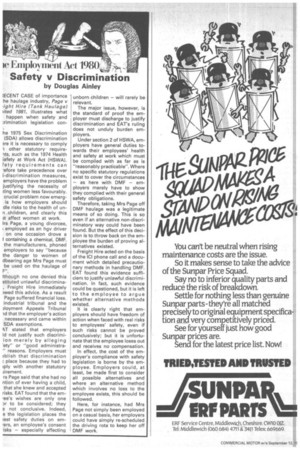Le Employment Act 198O
Page 72

If you've noticed an error in this article please click here to report it so we can fix it.
Safety v Discrimination
by Douglas Ainley
1ECENT CASE of importance he haulage industry, Page v ight Hire (Tank Haulage) )ited 1981, illustrates what happen when safety and ;rimination legislation con he 1975 Sex Discriminaiion (SDA) allows discrimination 3re it is necessary to comply
other statutoryrequire-its, such as the 1974 Health iafety at Work Act (HSWA). Fety requirements can -efore take precedence over i-discrimination measures, employers have the problem justifying the necessity of ling women less favourably. crucial problem now emerg is how employers should die risks to the health of unn children, and clearly this -3-t affect women at work.
Irs Page, a young divorcee, ; employed as an hgv driver on one occasion drove a I containing a chemical, DMF. the manufacturers, phoned employers to say "because the danger to women of dbearing age Mrs Page must be used on the haulage of F".
'though no one denied this stituted unlawful discrimina, Freight Hire immediately Awed this advice. As a result Page suffered financial loss.
industrial tribunal and the )loyment Appeals Tribunal id that the employer's action necessary and came within SDA exemptions.
VI stated that employers Id not justify such discrimiion merely by alleging Iety" or "good administra" reasons. Employers must• iblish that discrimination ; place because they had to iply with another statutory
Jirement.
rs Page said that she had no ntion of ever having a child,
that she knew and accepted risks. EAT found that the emree's wishes are only one D r to be considered; they
• not conclusive. Indeed,
e the legislation places the lest safety duties on em,ers, an employee's consent isks — especially affecting
unborn Children — will rarely be relevant.
The major issue, however, is the standard of proof the employer roust discharge to justify discrimination and EAT's ruling does not unduly burden employers.
Under section 2 of HSWA, employers have general duties towards their employees' health and safety at work which must be compiled with as far as is "reasonably practicable". Where no specific statutory regulations exist to cover the circumstances — as here with DMF — employers merely have to show they complied with their general safety obligations.
Therefore, taking Mrs Page off DMF haulage was a legitimate means of so doing. This is so even if an alternative non-discriminatory way could have been found. But the effect of this decision is to throw back on the employee the burden of proving alternatives existed.
Freight Hire acted on the basis of the ICI phone call and a document which detailed precautionary methods in handling DMF. EAT found this evidence sufficient to justify unlawful discrimination. In fact, such evidence could be questioned, but it is left to the employee to argue whether alternative methods existed.
It is clearly right that employers should have freedom of action when faced with real risks to employees' safety, even if such risks cannot be proved conclusively; but it is unfortunate that the employee loses out and receives no compensation.
In effect, the cost of the employer's compliance with safety legislation is borne by the employee. Employers could, at least, be made first to consider all possible alternatives and where an alternative method which involves no loss to the employee exists, this should be followed.
Here, for instance, had Mrs Page not simply been employed on a casual basis, her employers could have simply re-scheduled the driving rota to keep her off DMF work.








































































